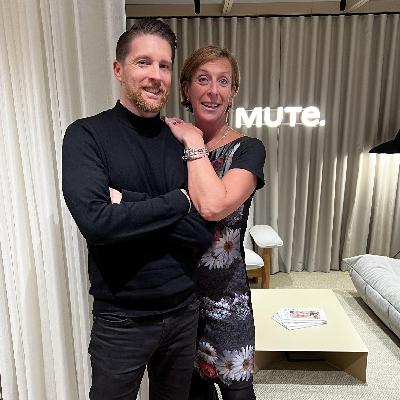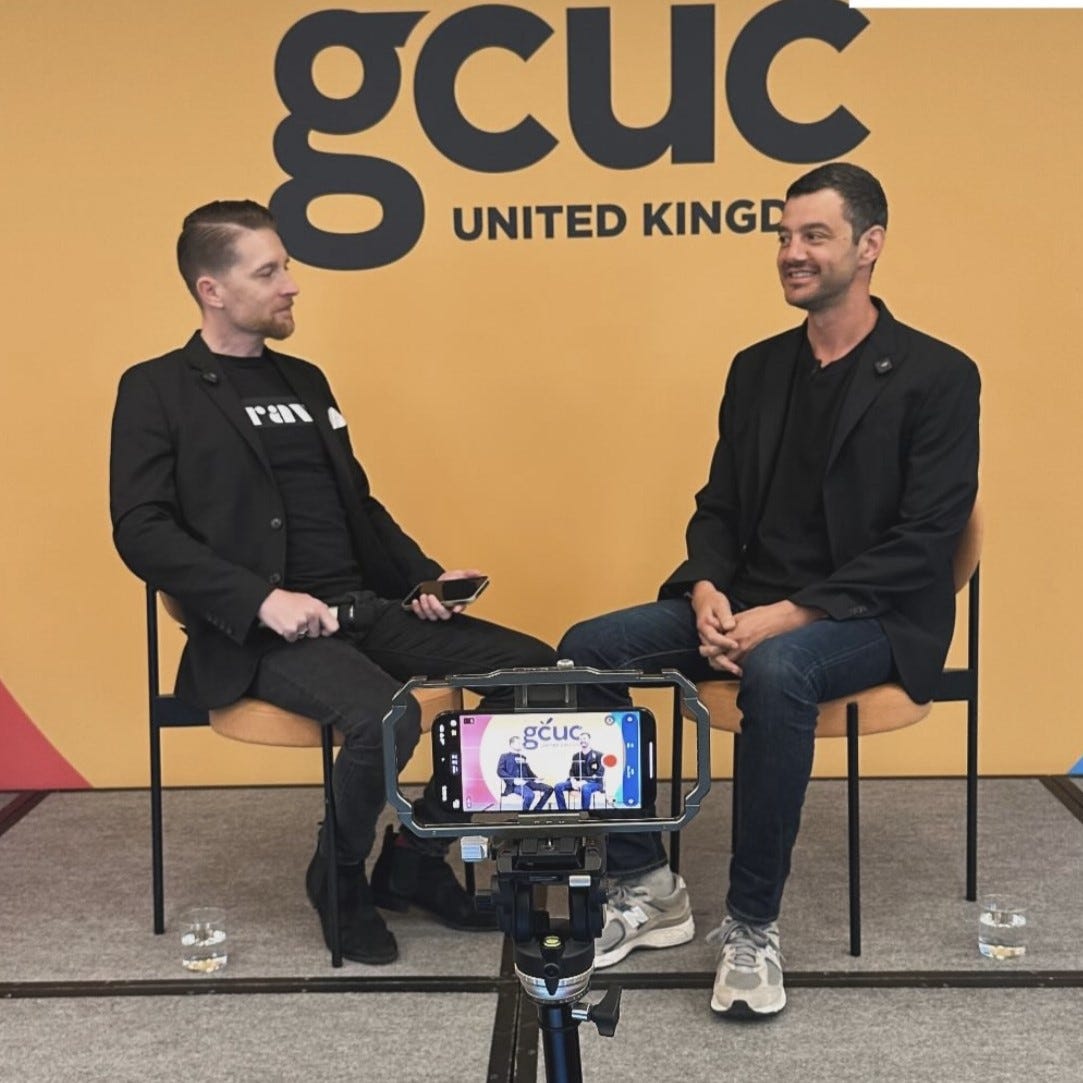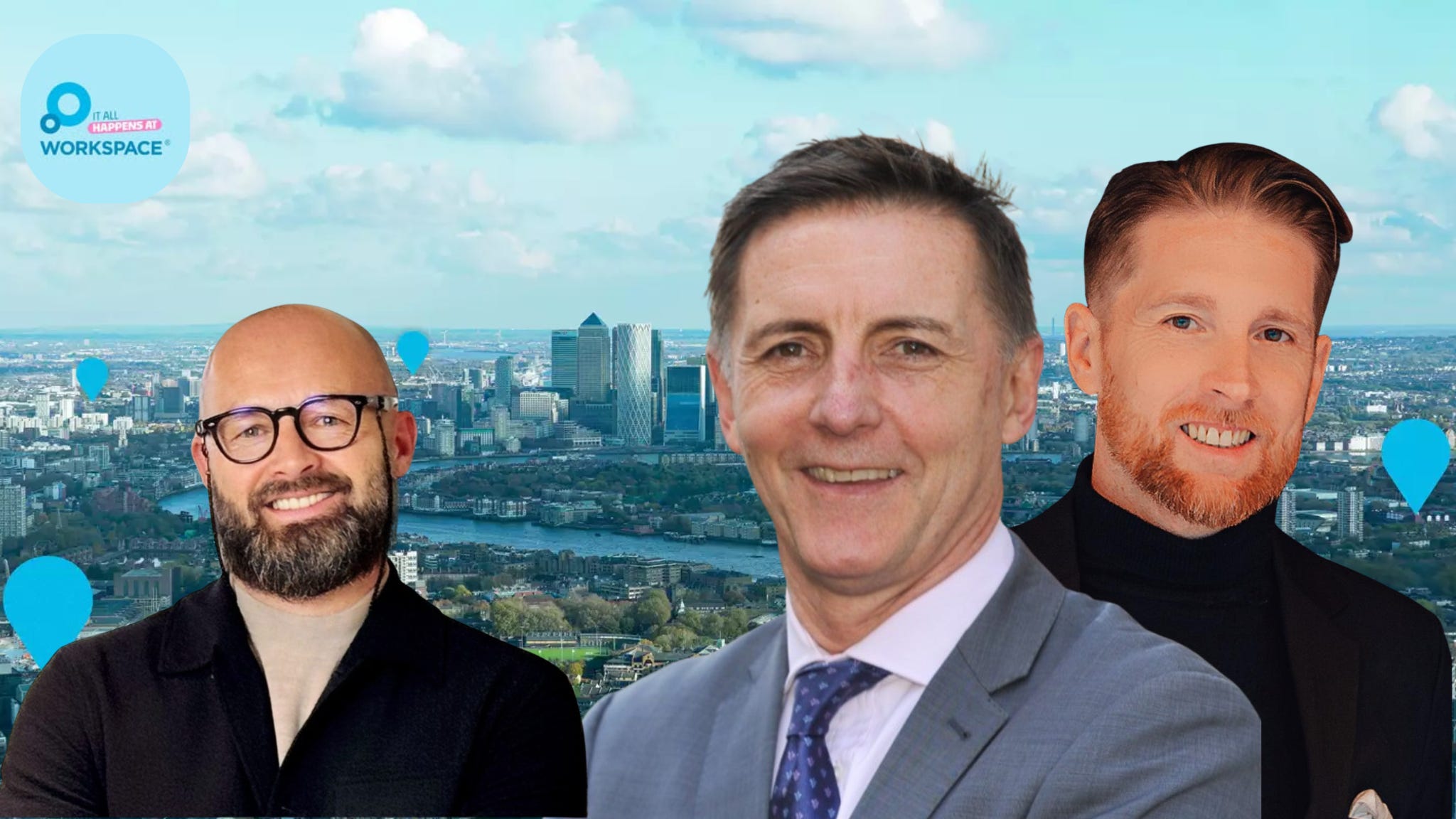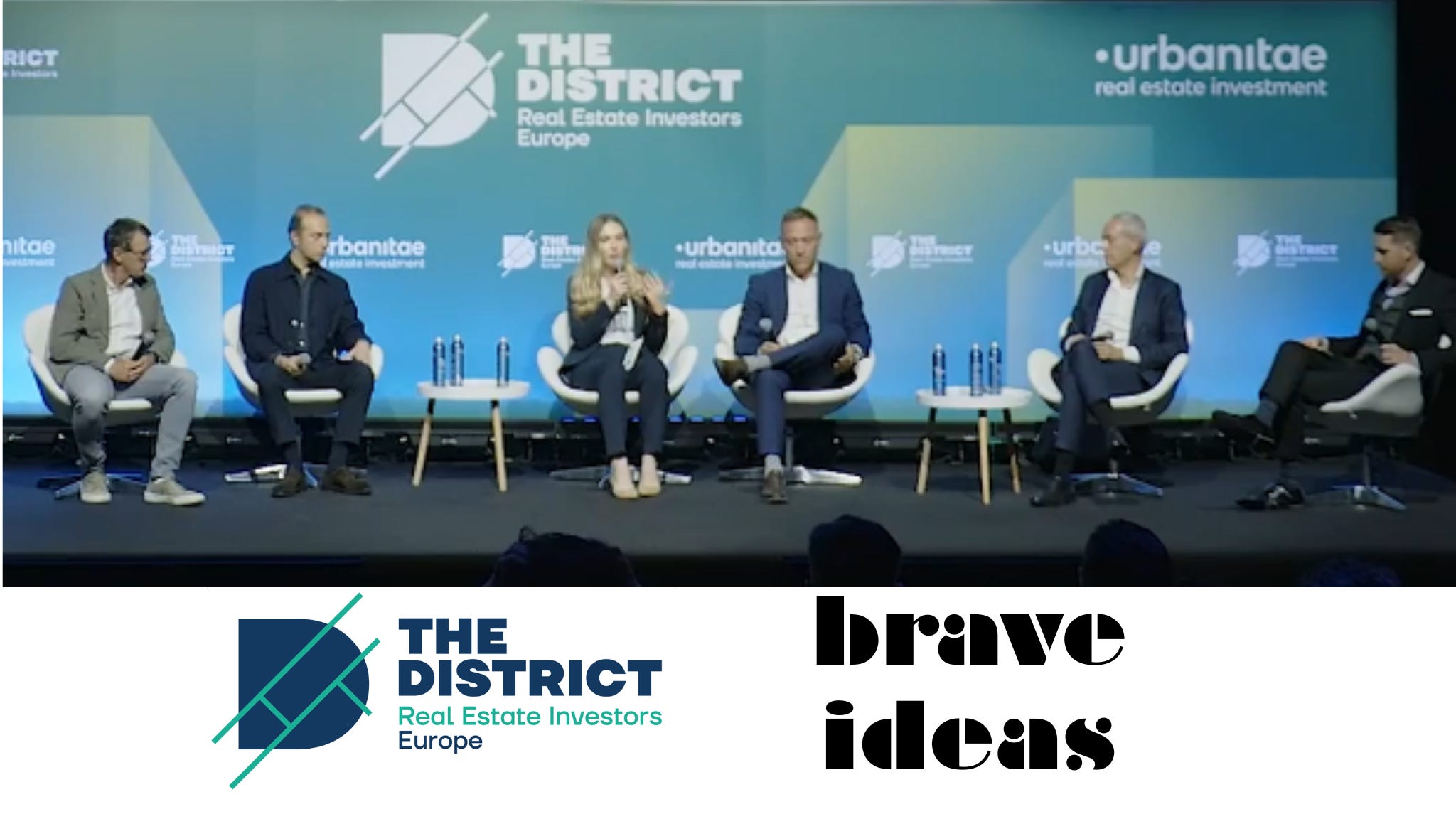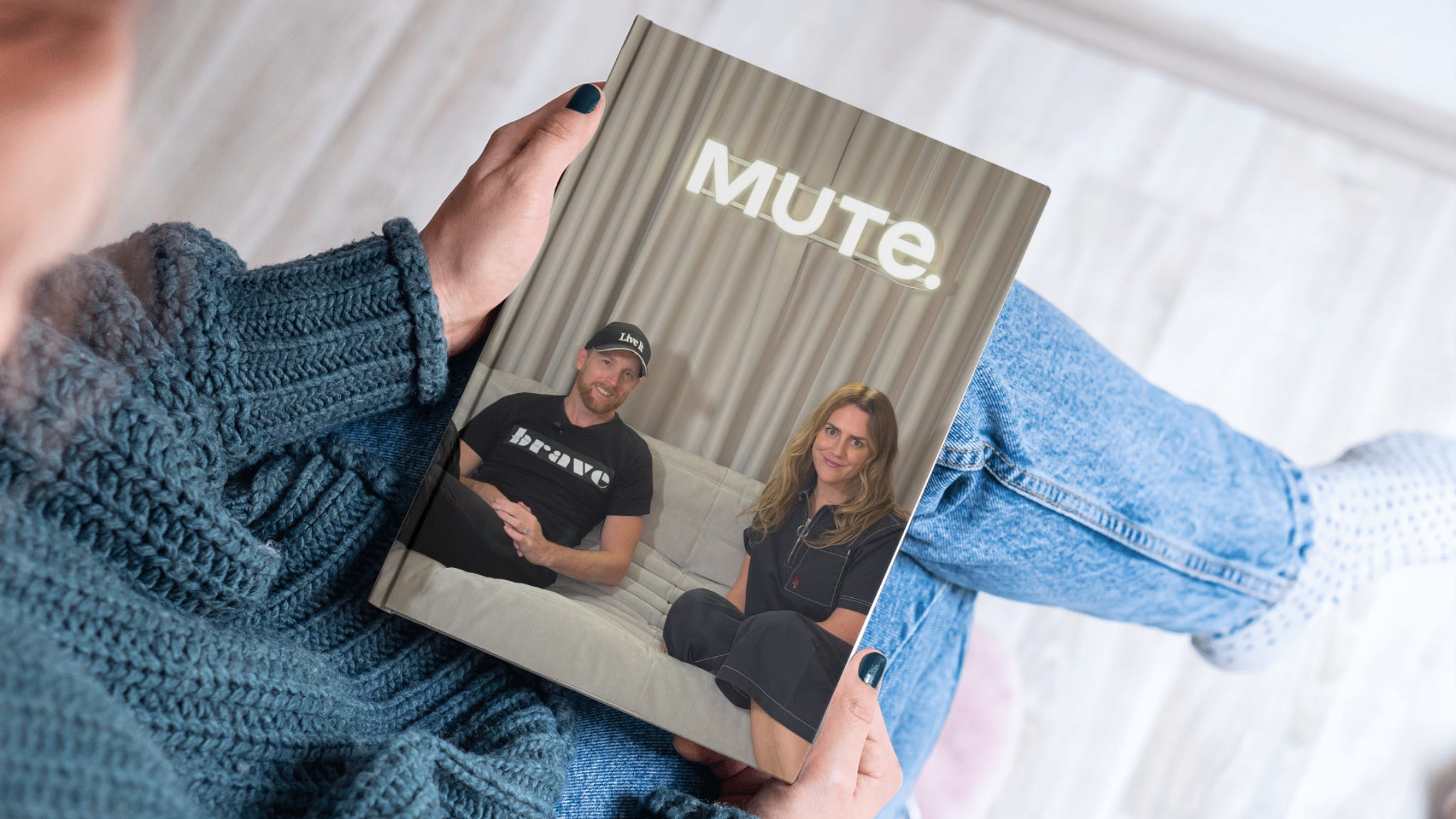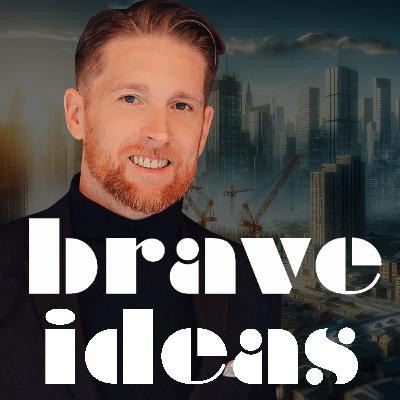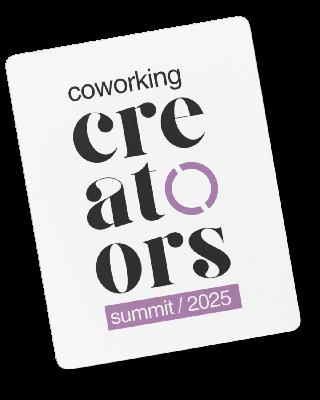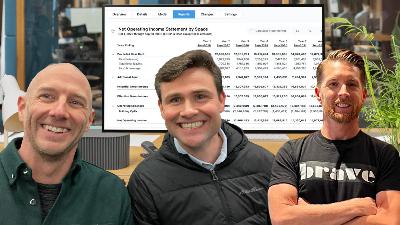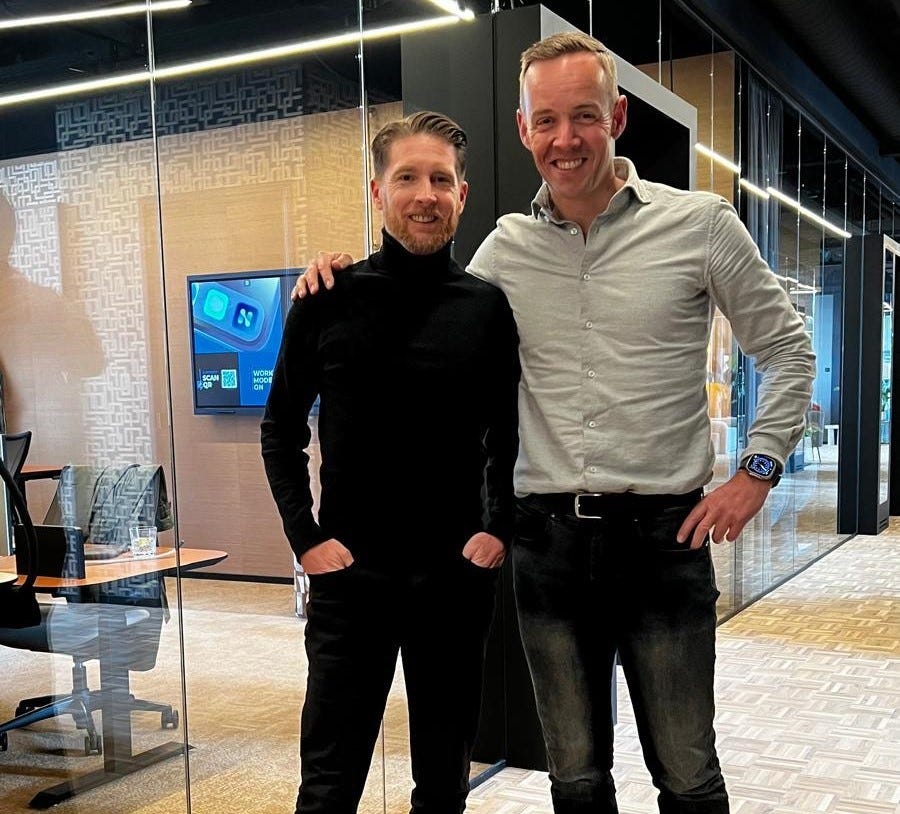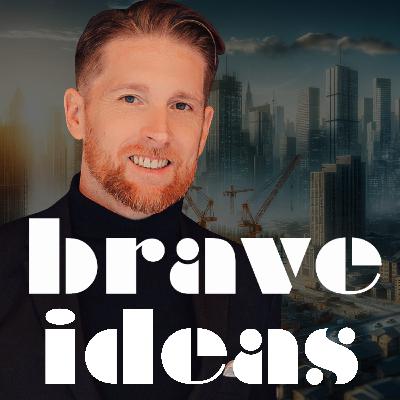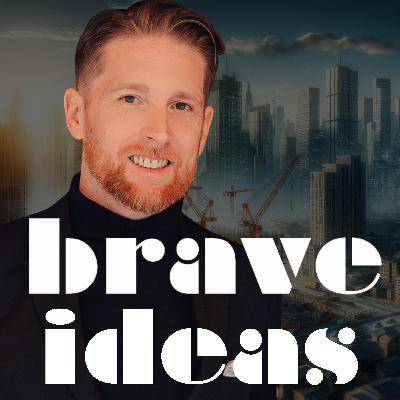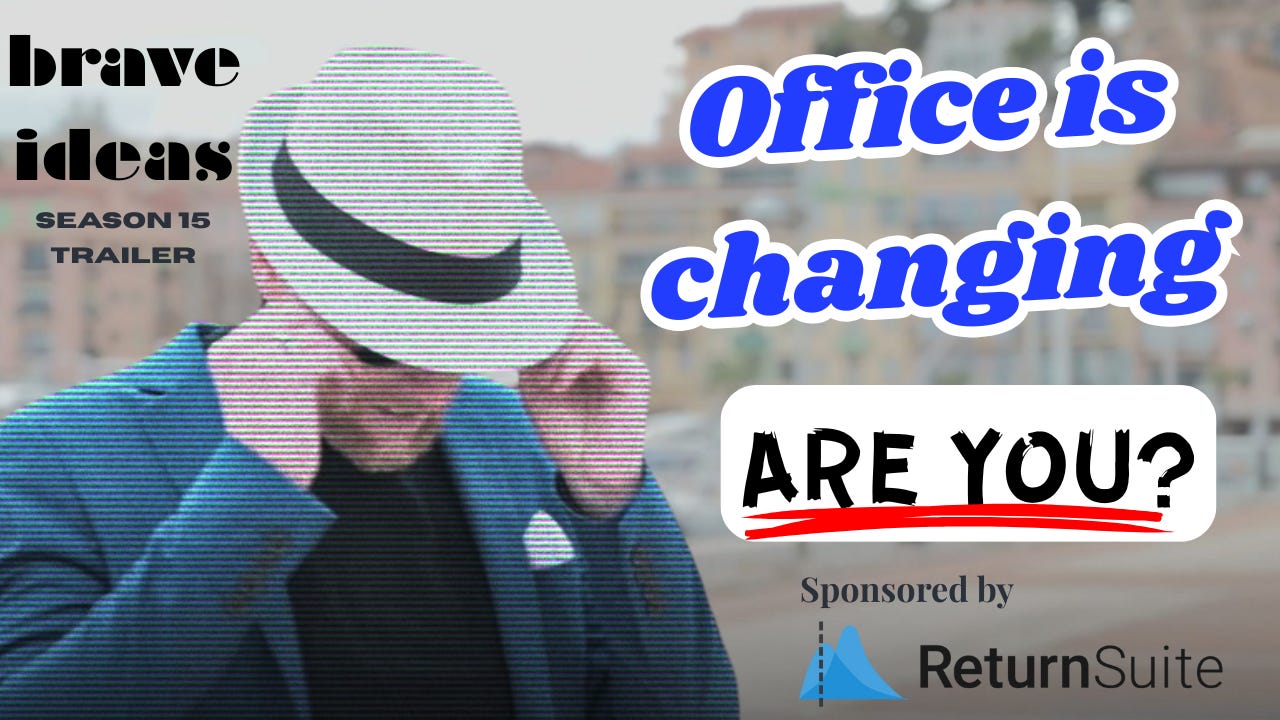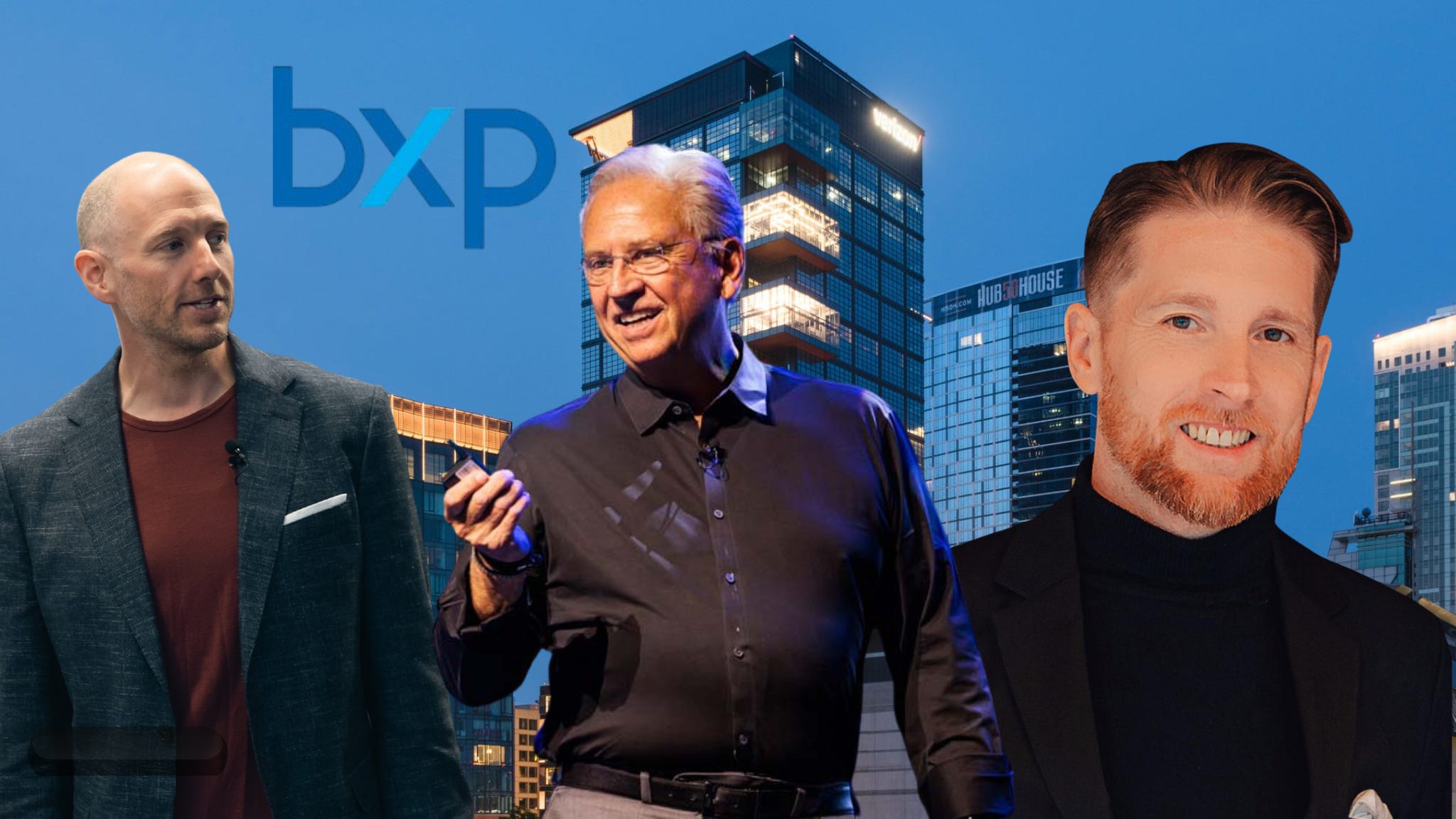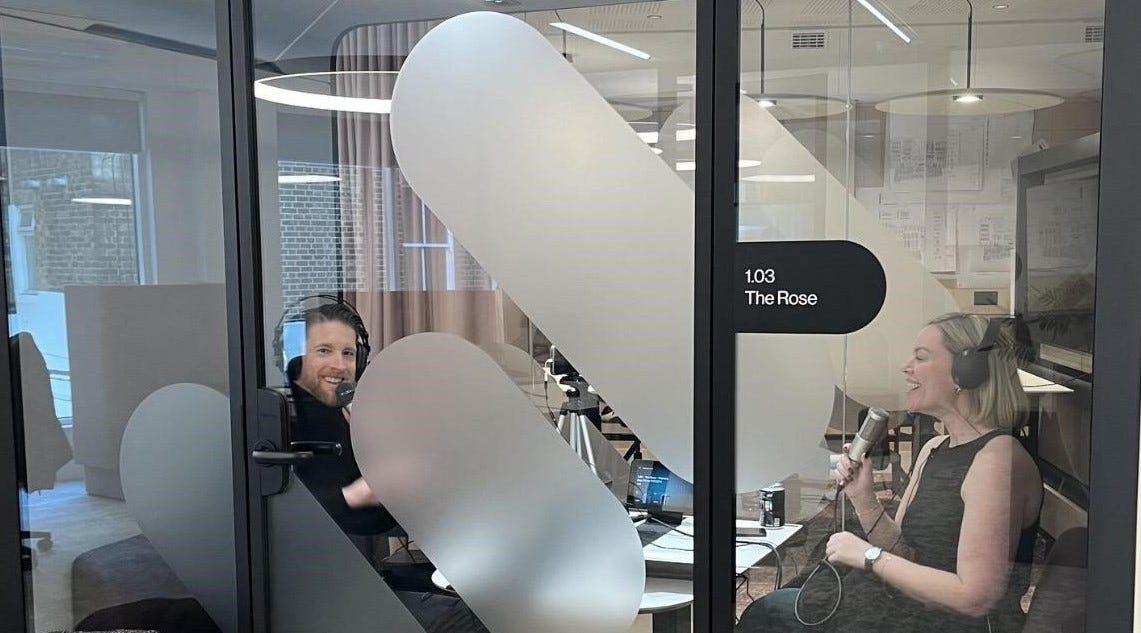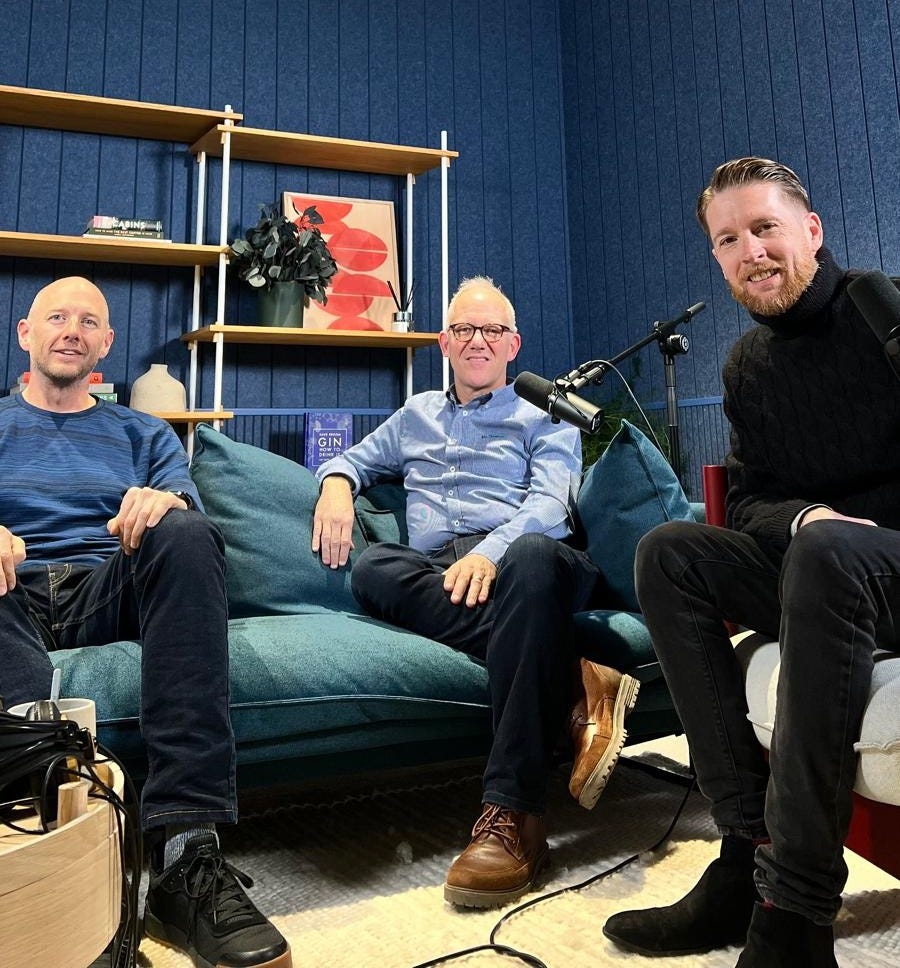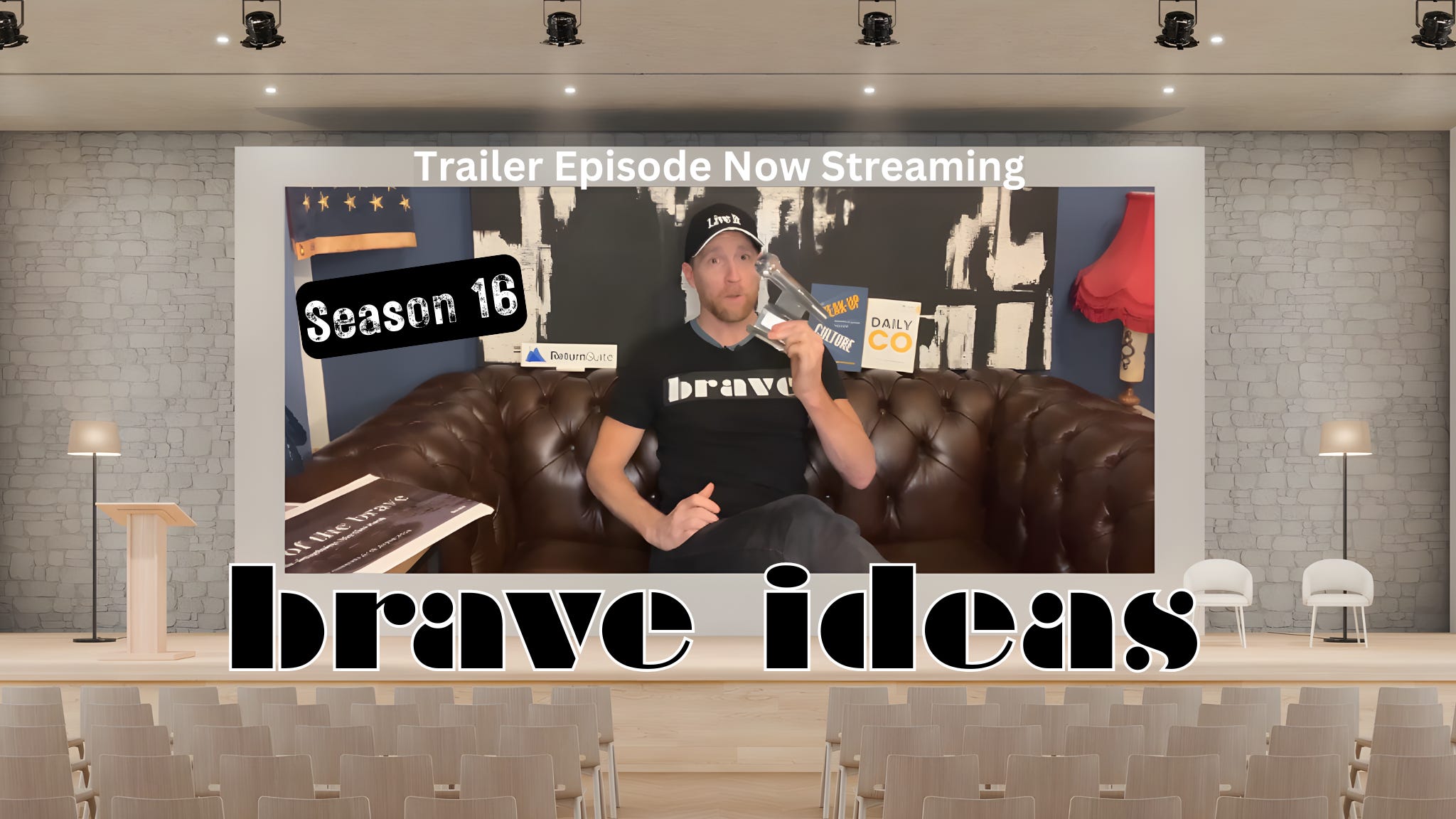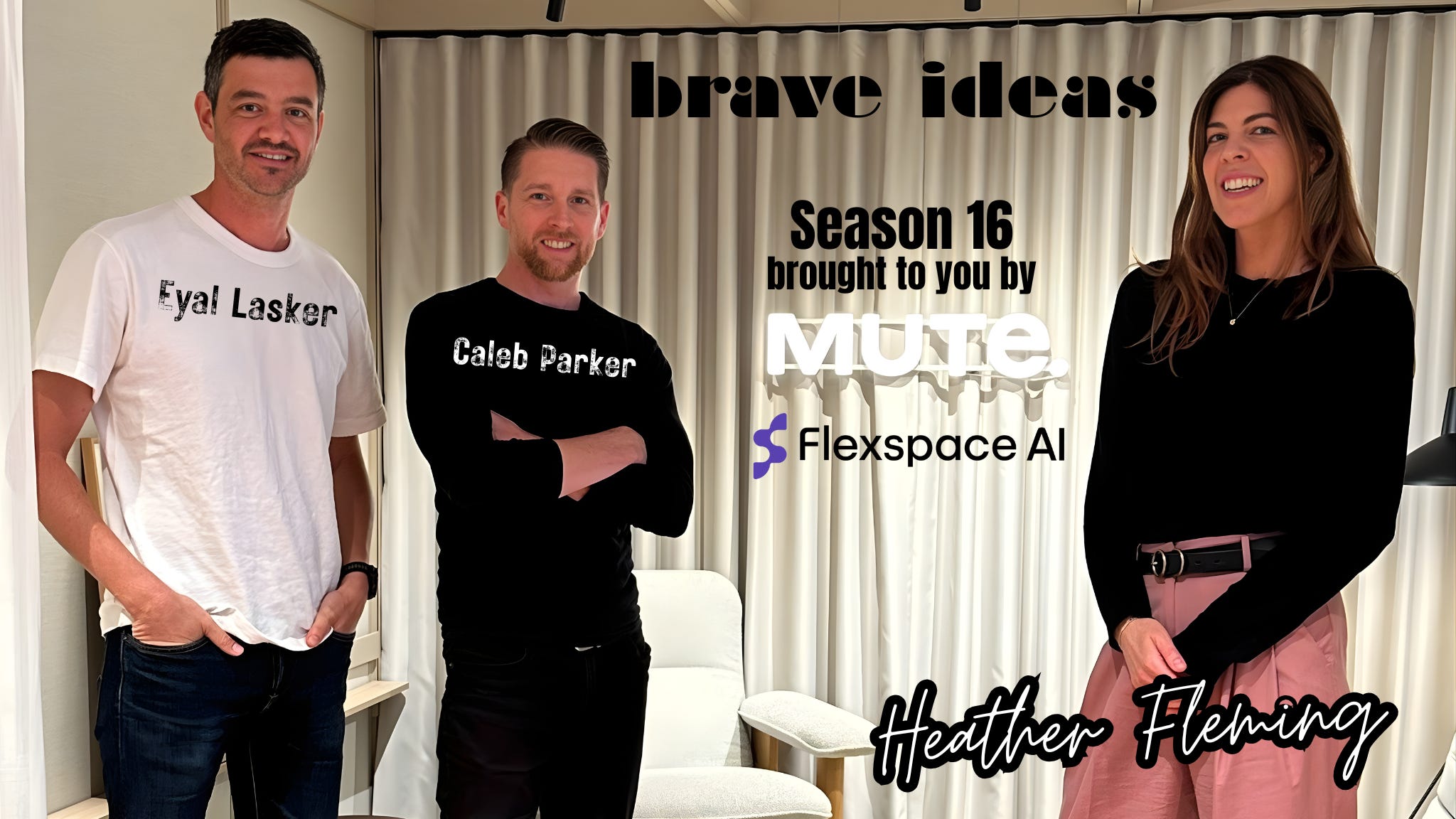Discover Brave Ideas
Brave Ideas

Brave Ideas
Author: Hosted by Caleb Parker
Subscribed: 8Played: 426Subscribe
Share
© Brave Corporation Ltd.
Description
Join award winning podcaster and CEO of Brave Corporation, Caleb Parker, as he shines a light on the entrepreneurs, intrapreneurs, and brave ideas at the forefront of innovation, who are creating the future of office real estate.
Brave Ideas dives deep into the stories of the visionaries, zooms out to discuss the macro trends driving change in demand for the office, and brings you thought provoking and insightful content from the innovators challenging the status quo as we know it today.
Subscribe to this podcast and our Brave Ideas Newsletter for weekly updates at www.BraveIdeas.media
www.braveideas.media
Brave Ideas dives deep into the stories of the visionaries, zooms out to discuss the macro trends driving change in demand for the office, and brings you thought provoking and insightful content from the innovators challenging the status quo as we know it today.
Subscribe to this podcast and our Brave Ideas Newsletter for weekly updates at www.BraveIdeas.media
www.braveideas.media
174 Episodes
Reverse
Brave Ideas Season 16, Episode 5Brought you by MUTEExplore how Mute is leading the adaptable office architecture evolution, offering modular solutions to futureproof office investments while significantly reducing construction costs and CO₂ emissions. Tap hereVisit www.BraveIdeas.media to watch an exclusive “Behind the Scenes” content.Don’t Oversimplify the Evolution of OfficeIn this episode, Brave Corp CEO, Caleb Parker, sits down with Niki Fuchs, Group CEO for Office Space in Town inside the MUTE Showroom in Clerkenwell London to discuss what Niki has been up to in the hospitality industry (she bought a hotel) and diver into the similarities and differences between hotels and hospitality-led workplaces.The conversation covers five overarching themes:* Culture turnarounds and presence-led leadership* How offices differ from hotels* Whole-building service models* PropCo-OpCo Structures that align risk and cash flow* Brand, design, and differentiation that reduce churnCONNECT* Niki Fuchs* Office Space in Town* Burgh Island Hotel* Workspace Intelligence Network* MUTE* Flexspace AI* Caleb ParkerVisit www.BraveIdeas.media to watch an exclusive “Behind the Scenes” content.What You’ll Learn in This Episode* How “presence” is operationalised, recurring one-to-ones, visibility windows, and why predictability builds trust* The practical test for cultural fit, why “feeling watched” signals misalignment and how to act decisively* Why office relationships behave like returning-guest dynamics, rising expectations and service memory over time* How OSIT’s general managers run the full business in-building, sales, service, commercials, and risk handling* Why front of house must sit under the operator to unlock building-wide service and faster issue resolution* What OSIT uncovered by bringing FM and cleaning in-house, control, cost, and risk gaps you can close* How profit-sharing leases flow from opcos to propcos, and why that matters for cash distribution and control* Ways to structure for landlord comfort, separating services where needed without losing operational coherence* Where an interim “middle investor” can bridge CapEx to stabilisation, and when that capital makes sense* Why valuation and exit remain the sticking points for flex-heavy assets, and the signals investors still look for* How differentiated theming and brand cues create emotional stickiness, and why “nice but same” invites churnKey Takeaways for Operators* A playbook for presence, consistency, transparency, and calibrated vulnerability that rebuilds trust fast* How to run long-horizon relationships, hospitality skills plus on-site commercial understanding* Why GM P&L ownership, unified sales and service, and control of front of house, FM, and cleaning protect NOI* How to choose structure for your deal, management agreement vs lease, profit-share mechanics, CapEx staging* How brand-led hospitality and distinctive design reduce churn and increase lifetime valueKey Takeaways for Real Estate Investors and Landlords* Why hotelification is a shortcut term, and why offices need relationship engines and operating platforms* How whole-building service increases resilience, align incentives to wrap service around every occupant* How to match structure to risk appetite, lease, management, or hybrid with clear profit participation* How interim capital can de-risk ramp-up, conservative underwriting protects board outcomes* What to update in valuation lenses, pricing operational income, retention, and brand stickiness, not just initial yieldBehind The ScenesVisit www.BraveIdeas.media to watch an exclusive “Behind the Scenes” content.💡 This episode is part of Brave Ideas Season 16, diving into the 6 Pillars of Space as a Service, spotlighting operator playbooks and practical moves that lift demand, protect margins, and build workplaces people choose. This is a public episode. If you'd like to discuss this with other subscribers or get access to bonus episodes, visit www.braveideas.media/subscribe
This special GCUC UK x Brave Ideas episode features Caleb Parker with Eyal Lasker, CEO of Flexspace AI, recorded live on the GCUC stage in London, England.Visit BraveIdeas.media to watch an exclusive “Behind the Scenes” clip that the GCUC audience saw before the official start of this Brave Ideas podcast episode.The EpisodeHotels have run revenue management for decades, and now coworking is beginning to use AI powered dynamic pricing to lift conversion, rate, and total revenue.In this epidode, Caleb & Eyal connect hotel-style revenue management to coworking, discuss why flex office has lagged in hospitality industry best practices, and why ecommerce is the practical on ramp.Eyal explains how an autonomous pricing agent learns from past data, live conversion, seasonality, and market signals to set prices, and that a 1% price drop correlates with 3% more bookings.The two go on to cover guardrails, floor and ceiling pricing, why prices vary by day and hour rather than by person, how office pricing is rolling out after meeting rooms and day passes, and what lenders need before financing flex at scale.Visit BraveIdeas.media to watch this episode and access behind the scenes.CONNECT* Eyal Lasker* Visit FlexSpace.ai* Caleb Parker* Visit GCUC-UK* Book your ticket to GCUC NYC in AprilWhat You’ll Learn in This Episode* How AI powered dynamic pricing works in flex, inputs, learning loops, and outcomes* How to set smart guardrails, floor and ceiling, while letting the system run autonomously* Where elasticity shows up in flex, increasing volume and effective yield* How to connect website, CRM, and occupancy so pricing, sales, and community act in sync* What needs to exist for dynamic pricing of offices, monthly and annual agreements* What lenders and investors need, forward revenue signals and reliable modelsKey Takeaways for Operators* Enable ecommerce for on-demand products, treat them as top of funnel with a goal of negative CAC (customer acquisition cost)* Use AI to reprice by hour and day, reserve human time for hospitality and community* Track drop offs and non-conversions, feed retargeting and pricing adjustments automatically* Nudge frequent on demand users into memberships or offices, protect revenue with overflow logic* Monitor elasticity and conversion weekly, adjust guardrails rather than micromanaging priceKey Takeaways for Real Estate Investors and Landlords* Flex is operational real estate, value depends on systems, data, and service, not only fit out* Dynamic pricing data improves forecasting, supports valuation and debt conversations* Hospitality and community increase retention and pricing power, supporting NOI* Industry benchmarks like WIN can inform underwriting when linked to pricing engines💡 This episode is part of Brave Ideas Season 16, diving into the 6 Pillars of Space as a Service, spotlighting operator playbooks and practical moves that lift demand, protect margins, and build workplaces people choose. This is a public episode. If you'd like to discuss this with other subscribers or get access to bonus episodes, visit www.braveideas.media/subscribe
Brave Ideas Season 16, Episode 2Brought you by MUTEExplore how Mute is leading the adaptable office architecture evolution, offering modular solutions to futureproof office investments while significantly reducing construction costs and CO₂ emissions. Tap hereWorkspace proves flex works when you run it like a platform, not a product.In this episode, Brave Corp CEO, Caleb Parker, and co-host Gary Helm from MUTE sits down with Lawrence Hutchings, CEO of Workspace Group PLC, the UK’s only publicly listed flex operator, to unpack an institutional mindset meeting operational reality and how the platform’s “Fix, Accelerate, Scale” strategy aims to drive occupancy, earnings, and growth.This conversation covers broad topics such as the parallels Lawrence sees between office and his operational real estate experience, the retail lessons that apply, and the thesis behind recycling capital for growth.They also go deep into workplace design that wins customers and tactics for improving meeting room performance.This episode was recorded onside at the MUTE Showroom in Clerkenwell, London.TO WATCH THE FULL EPISODE and access behind the scenes content,visit www.braveideas.mediaCONNECT* Lawrence Hutchings* Visit Workspace Group PLC’s website* Caleb Parker* Gary Helm* Visit MUTE’s website* Fenwick Rd Coffee CompanyWhat You’ll Learn in This Episode* Why flex is a high velocity platform business, not a long lease model* Workspace Group’s fix, accelerate, scale strategy, occupancy as the lead indicator, rate as the secondary lever* Retail lessons that map to office, headlines versus reality, attendance versus utilization, culture and collaboration still drive value* Capital light upgrades at Vox Studios and Leather Market, front door to corridors to end of trip, how first impressions lift tours and retention* Meeting rooms and technology, open to non members with member priority, CRM and AI for smarter utilization, cluster overflow to protect revenue* Growth thesis, recycle capital out of lower return Southeast assets, double down in London, target SMEs with a data led map to find the next BermondseyKey Takeaways for Operatorssponsored by* You win or lose tours at the front door and on the walk to the unit* Invest in high touch areas, lobbies, corridors, kitchenettes, bathrooms, end of trip; small CapEx, big perceived value* Empower local teams with data; push decisions to the front line for retention and conversion* Use modular meeting and focus spaces to adapt quickly and improve acoustics* Prioritize members on peak days; use smarter booking rules and cluster overflow to keep revenue in networkKey Takeaways for Real Estate Investors and Landlords* Flex is operational real estate; build or partner for a platform, not just fitted floors* Occupancy drives income, rate follows tension; vacancy carries service charges and business rates, so the cost is higher than rent lost* Recycle capital into product that competes; upgrade existing buildings where demand exists* Segment by customer; specialize using demographics and psychographics rather than one size fits all* Target assets with the right bones; transport connectivity, natural light, floor plates that subdivide well, characterful buildings in the 50K to 90K SqFt sweet spot💡 This episode is part of Brave Ideas Season 16, diving into the 6 Pillars of Space-as-a-Service, spotlighting operator playbooks and practical moves that lift demand, protect margins, and build workplaces people choose. This is a public episode. If you'd like to discuss this with other subscribers or get access to bonus episodes, visit www.braveideas.media/subscribe
Brave Ideas Season 16, Episode 1Brought to you by Flexspace AIIn this episode, Brave Corp CEO, Caleb Parker, moderates a panel recorded on stage at The District Show in Barcelona with leaders from LOOM by Merlin Properties, Newmark, Sutega, Assembly Buildings, and World Trade Center Barcelona.Tune in to hear how operators and landlords are turning buildings into workplaces people choose, why OPEX in people can beat CAPEX in marble, and how amenity strategy, programming, technology, and brand convert into office value.🎥 Visit www.BraveIdeas.media to watch this episode and to view a behind the scenes interviews bonus episodeConnect with the panelists* Fernando Ramirez Baeza (Director, LOOM at Merlin Properties)* Morgan Pierstorff (Director Occupier Experience EMEA, Newmark)* Gregorio Olmeda (Head of Business Development, Sutega)* Yiğit Şatıroğlu (Cofounder, Assembly Buildings)* Carles Anglada (CEO, World Trade Center Barcelona)* Caleb Parker (CEO, Brave Corporation)Brought to you by Flexspace AILearn how Flexspace AI is transforming coworking with their ecommerce revenue platform, featuring SmartPricing Agent, an AI-powered dynamic pricing engine.💡 This episode is part of Brave Ideas Season 16, diving into the 6 Pillars of Space-as-a-Service, spotlighting operator playbooks and practical moves that lift demand, protect margins, and build workplaces people choose. This is a public episode. If you'd like to discuss this with other subscribers or get access to bonus episodes, visit www.braveideas.media/subscribe
GCUC UK lands in London next week; go behind the scenes with Emilie Lashmar before you go | Grab a ticket here.For this Special Edition Brave Ideas episode in collaboration with GCUC UK , Brave Corp CEO, Caleb Parker sits down with Emilie Lashmar in the MUTE Showroom in Clerkenwell London to unpack what drives Emilie’s passion for coworking, what ignited her career and why GCUC UK.The conversation explores how brand, hospitality, and community shape modern workplaces, and covers the evolution of coworking in the UK, the tension between purist vibes and scalable operations, and how to attract enterprise members without diluting the energy that makes a space feel alive.🎧 To listen as a podcast FOR FREE,follow Brave Ideas on Apple, Spotify, or wherever you listen.What you will learn* Why brand is a lived experience, not a logo, and how to operationalise it across hiring, sales, and daily rituals* How design and hospitality create belonging and help people do better work* Practical ways independents can scale while protecting authenticity and community* Product mix and floorplate strategy, how to blend coworking, studios, and managed space for margin and vibe* Recruiting for values, building playbooks, and training teams so the culture travels* Enterprise demand, how to welcome larger members while keeping the room diverse and collaborative* Year-round community, why intimate peer groups and regional touchpoints matter for operatorsWho should watch/listenLandlords exploring flex, independent operators, brand and community leads, enterprise workplace teams, investors seeking the commercial levers behind flex.Key Topics MentionedBrand and community, hospitality mindset in operations, independents and corporates learning from each other, brokers and brand alignment, member experience as a driver of choice and performance, stress management ahead of conference season, the future of GCUC UK with more intimate peer groups and regional moments.CONNECT* Connect with Emilie* Visit GCUC UK Website* Grab a ticket* Connect with CalebBEHIND THE SCENES(and previous GCUC snaps) This is a public episode. If you'd like to discuss this with other subscribers or get access to bonus episodes, visit www.braveideas.media/subscribe
A Brave Ideas Special Feature📺 WATCH the full episode EXCLUSIVELY on BraveIdeas.mediaWhy Flex Operators Must Think Like AirbnbIn this episode, Brave Corp CEO, Caleb Parker, is joined by Ivan Guberkov Chief Product Officer at OfficeRnD, to explore why coworking must adopt an Airbnb-style e-commerce mindset before it can achieve the brand power of Soho House.Actionable strategies every operator can apply, including:* Open vs closed tech stacksHow to audit your systems, avoid lock-in contracts, and prioritize integrations that protect flexibility and ROI* Selling like AirbnbWhy seamless digital experiences, real-time availability, and transparent pricing are critical for winning members* Revenue management & dynamic pricingHow to approach it without the AI hype, when it makes sense to start, and who in your team should own it* AI sales agentsThe promise, pitfalls, and the baseline data you need before implementation* Automation for efficiencyFreeing your team from admin tasks so they can focus on hospitality and the member experience* The evolving role of brokersShifting from traditional middlemen to tech-enabled affiliates in a future of real-time inventory and global distributionWho Should Watch/Listen?Whether you run a single coworking location or a global flex portfolio, this episode is packed with insights to future-proof your operations and keep your team focused on what matters most—your members.Connect* Connect with Ivan Guberkov* Learn about Office RnD* Connect with Caleb ParkerThis Brave Ideas Special Feature is brought to you in partnership with Office RnD, customizable coworking and workplace management platform. This is a public episode. If you'd like to discuss this with other subscribers or get access to bonus episodes, visit www.braveideas.media/subscribe
Special Feature Bonus EpisodeThis one is for the creators! Forward this to your team member who manages your marketing, social media and/or community.📺 Watch the full show at www.BraveIdeas.mediaContent is the best way to differentiate your brand isIn this conversation, Brave Corp CEO, Caleb Parker, chats with Cat Johnson to get the details behind the Coworking Creators Summit 2025.(Scroll down for event details)This Special FeatureIn this conversation Caleb asks Cat to go behind the scenes, from the early day’s of her career to finding her vibe with coworking to becoming a coworking community champion and coach, and why she care’s so much about helping coworking brands (her why).They dive into how content marketing helps coworking brand differentiate, and explore the significance of understanding one's ideal customer.This discussion highlights the need for coworking spaces to reflect their local communities and the future of work, which increasingly values in-person connections and flexibility.🎧 To listen as a podcast FOR FREE,follow Brave Ideas on Apple, Spotify, or wherever you listen.The EventThe Coworking Creators Summit is a new virtual event created for people who run and market coworking spaces.Happening October 23 from 9am–1pm Pacific, the half-day summit features eight expert guest teachers sharing what’s working right now in coworking marketing, content strategy, storytelling, and community building.Topics include:📸 Capturing better photos🗣️ Storytelling and visibility🧠 Finding your brand voice🧩 Content distribution strategy💛 Creating connection through content📈 Differentiating your space with content🎟 $99 Live Pass | $129 Pro Pass (includes recordings + bonus content)🌐 Learn more and get your pass at coworkingcreators.com This is a public episode. If you'd like to discuss this with other subscribers or get access to bonus episodes, visit www.braveideas.media/subscribe
Brave Ideas Season 15, Episode 10📺 Watch the full episode EXCLUSIVELY on BraveIdeas.media This episode is made possible by ReturnSuite:”Complex Cash Flow Modeling Simplified.”Valuation, brand, and the lease-to-management spectrumIn this episode, Brave Corp CEO, Caleb Parker, is joined by Carl-Johan Collet in the Brave Ideas Virtual Studio from Copenhagen, Denmark.In addition to his role at Catella, Carl-Johan is Co-Chair of ULI’s Operational Real Estate Forum, alongside Valentina Shegoyan.Tune into this final episode of Season 15 to hear why operational real estate is spreading across asset classes, how brand matters for investors and landlords, why office valuation must move from binary leases to modeling variable cash flows directly and how insurance-style risk modeling can better price variability in operating income.🎧 To listen as a podcast FOR FREE,follow Brave Ideas on Apple, Spotify, or wherever you listen.What You’ll Learn in This Episode* What “operational real estate” means in practice, and why focused customer segments, brand, and tech sit at the core across office, living, hotels, logistics, and more.* Why brand is an outcome of consistent service to a defined customer, earning trust and pricing power.* How office valuation can evolve by pricing risk in the cash flows, borrowing methods from insurance rather than hiding risk in higher discount rates.* Where alignment lives along the structure spectrum, from fixed leases to hybrid base-plus-participation to management agreements.* Why many flex operators will take 10–15-year terms while most office tenants still prefer three to five.Key Takeaways for Operators* Define your sharpest customer segment, then build service delivery and amenities for that user, not the average occupier, to unlock willingness to pay.* Brand is the result of delivering the same promise, every time; consistency is what compounds trust and demand.* Expect more variable revenue over time, and be ready to evidence it with operational data that supports insurance-style risk modeling.Key Takeaways for Real Estate Investors* Model variability where it lives, in NOI, using scenario-based methods so both downside protection and upside share are explicit.* Choose structures that match capital and exit: core buyers may prefer leases, core-plus may accept hybrids, long-term owners can lean into management agreements for upside.* Pick the right operator for the building’s location and customer base, alignment matters more than face rent when the business is operational.CONNECT* Connect with Carl-Johan* Connect with Caleb Parker* Connect with Sam Gamble* Learn about ReturnSuite💡 This episode is part of Brave Ideas Season 15, exploring brave ideas shaping the future of office real estate, Space-as-a-Service, and workplace experience.Join the Conversation🎧 Listen now and see how operational real estate reframes office valuation by pricing risk in the cash flows, why brand as an outcome drives loyalty and price, and how the spectrum from fixed leases to hybrid leases to management agreements aligns owners and operators; then drop a comment with your favourite soundbite. #PlusNotVersus This is a public episode. If you'd like to discuss this with other subscribers or get access to bonus episodes, visit www.braveideas.media/subscribe
Brave Ideas Season 15, Episode 8This episode is made possible by ReturnSuite:”Complex Cash Flow Modeling Simplified.”📺 Watch the full episode EXCLUSIVELY on (incl. behind the scenes and bloopers)Structuring equitable landlord-operator dealsIn this episode, Brave Corp CEO, Caleb Parker, and ReturnSuite Cofounder, Sam Gamble tee up a deep dive with Andy Igoe from New York City.We unpack how to replace desk-based pricing with licensable SqFt, how to build empirical comps from live market quotes, and how to model real ramps that reflect sales cycle times, seasonality, lead generation capacity, and customer size mix.Andy shares how his teams presented full upside and downside scenarios to landlords, how to align incentives across management agreements and hybrid leases, and why he believes private offices anchor the P&L while amenity areas support, not dilute, EBITDA.We close with when flex should be treated as a building-level amenity that lifts asset value even if modeled rent trails the headline rent number.What You’ll Learn in This Episode* How to price by licensable SqFt and translate competitor quotes into revenue per SqFt* Why the classic 30 percent to 90 percent ramp can mislead, and how to model local, operational reality* How sales cycle times, seasonality, and lead generation capacity shape a defendable ramp* How to align fees and waterfalls so site profitability comes first in owner–operator structures* When flex as an amenity improves whole-asset outcomes even at sub-headline rentKey Takeaways for Operators* Present pricing in SqFt with clear inclusions, move away from desk price for serious comparisons* Build empirical comps from local quotes, position your product inside the true market range* Size amenity areas to support sales and retention, protect breakeven and NOI* Use scenario ranges and mitigation levers to manage underperformance with ownersKey Takeaways for Real Estate Investors* Demand auditable underwriting with apples-to-apples pricing and real operational inputs* Align incentives to site profitability, avoid fee structures that reward revenue without cost discipline* Treat flex as a building amenity when it lifts leasing velocity, occupancy, and overall value* Benchmark models against market rent and realistic ramps that fit the floor plateCONNECT* Connect with Andy Igoe* Connect with Caleb Parker* Connect with Sam Gamble* Learn about ReturnSuiteBehind the Scenes(Keep scrolling for bloopers)Recorded remotely between London and New York City in the Brave Ideas virtual studio.BLOOPER REEL💡 This episode is part of Brave Ideas Season 15, exploring brave ideas shaping the future of office real estate, Space-as-a-Service, and workplace experience.Join the Conversation🎧 Listen now and see how licensable SqFt, empirical comps, and transparent scenarios make your flex model auditable, then drop a comment below with your favourite soundbite. This is a public episode. If you'd like to discuss this with other subscribers or get access to bonus episodes, visit www.braveideas.media/subscribe
Brave Ideas Season 15, Episode 5This episode is made possible by ReturnSuite:”Complex Cash Flow Modeling Simplified.”📺 Watch the full episode EXCLUSIVELY on BraveIdeas.media (incl. behind the scenes)Should Offices Transact Like Hotels?What if office space was sold like hotel rooms, priced by the hour, dynamically re-skinned for each occupant, and managed by tech that plays Tetris with demand?Rogier Braakman believes that is the future.In this episode, Brave Corp CEO Caleb Parker travelled to Amsterdam to tour Mr. Green and chat with their Chief Exec, Rogier Braakman, who breaks down Mr Green’s “properator” strategy—owning and operating buildings—plus the NetOS platform that lets companies share the same SqFt on different days, boosting NOI while slashing wasted space.🎧 To listen as a podcast FOR FREE,follow Brave Ideas on Apple, Spotify, or wherever you listen.Episode Highlights* 00:00 - Caleb & Sam episode intro* 03:15 - Rogier’s hospitality roots (Ritz-Carlton, Pillows Hotels) and the empty-office “aha” moment* 10:45 - Why utilization, not rent roll, is the only truly green metric* 18:20 - Pay-for-time pricing replaces SqFt leases — “No use, no pay”* 25:40 - Defining a properator (prop-co + op-co under one roof)* 32:10 - Inside NetOS: the tech stack that swaps brand identities and books space automatically* 41:05 - Building a “super flex” lung floor landlords can lease to multiple corporates on alternating days* 47:50 - How sharing drives a 2-3× revenue uplift even in down-cyclesKey Topics:* Empty desks are the real carbon sin. A fully utilised office is the only sustainable one, so pricing must follow actual occupancy, not fixed leases.* Time-based memberships beat long-term leases. Companies choose the exact days they need and pay only for the hours used.* Properator power. By owning buildings and operating them through NetOS, Mr Green captures both real-estate upside and hospitality margin in one structure.* Landlord win-win. Hand back under-used floors, let NetOS resell them on a super flex basis, and watch yield per SqFt rise.* Super Flex DNA. Think electric-vehicle equivalent for offices: lower base cost, higher performance, and a lighter environmental footprint.Why You Should WatchOffice vacancy is your biggest risk. Rogier Braakman reveals, with numbers and live examples, how time based pricing, owner operator alignment, and smart utilisation tech can turn dark desks into a revenue engine—essential viewing for anyone who signs, sells, or services office deals.CONNECT* Connect with Rogier Braakman* Visit Mr. Green’s website* Inquire about Net OS* Connect with Caleb Parker* Learn about ReturnSuiteFor behind the scenes, visit:https://www.braveideas.media/p/will-this-super-flex-model-make-empty?r=d1yie&utm_campaign=post&utm_medium=web&showWelcomeOnShare=false💡 This episode is part of Brave Ideas Season 15, exploring brave ideas shaping the future of office real estate, Space-as-a-Service, and workplace experience.Join the ConversationWhat would super flex mean for your portfolio or team culture? Drop a comment below, share the audio with a landlord who still loves ten-year leases, and subscribe so you never miss a #PlusNotVersus insight. This is a public episode. If you'd like to discuss this with other subscribers or get access to bonus episodes, visit www.braveideas.media/subscribe
📺 Watch the full episode EXCLUSIVELY on BraveIdeas.mediaThis episode is made possible by ReturnSuite:”Complex Cash Flow Modeling Simplified.”Why Hospitality Matters More Than EverMelissa Ansley has seen the flex office market evolve from every angle:Operator, Advisor, and now as Head of Flex Solutions & Partnerships for JLL across EMEA.In this episode, Melissa joins Brave Corp CEO Caleb Parker and ReturnSuite Cofounder, Sam Gamble, in person from MIPIM in Cannes to discuss what today’s customers really want from office space, why hospitality matters more than ever, and how flex is changing landlord strategies.Key Topics:* Why more occupiers are shifting from traditional leases to managed solutions* The growing demand for hospitality-infused, amenity-rich experiences* How to match the right operator brand to the right building* What landlords need to know about spec suites and short-form leases* The role of flex in creating leasing velocity and tenant stickinessWhy You Should WatchWhether you're a landlord, operator, broker, or investor, this episode is full of practical insights and behind-the-scenes intel from one of the industry’s most respected flex advisors.CONNECT* Connect with Melissa Ansley* Visit JLL’s website* Connect with Sam Gamble* Learn more about ReturnSuite* Connect with Caleb ParkerFor behind the scenes, visit:https://open.substack.com/pub/bravecorpideas/p/what-flex-office-customers-really?r=d1yie&utm_campaign=post&utm_medium=web&showWelcomeOnShare=true 💡 This episode is part of Brave Ideas Season 15, exploring brave ideas shaping the future of office real estate, coworking, and workplace experience.👉 Don’t forget to subscribe, like, and drop a comment with your take on Sam's ideas for modeling risk in operational real estate. This is a public episode. If you'd like to discuss this with other subscribers or get access to bonus episodes, visit www.braveideas.media/subscribe
📺 Watch the full episode EXCLUSIVELY on BraveIdeas.mediaTurning volatility into strategy in office real estate with Sam Gamble, CoFounder of Return SuiteThis episode is made possible by ReturnSuite:”Complex Cash Flow Modeling Simplified.”Maybe this was the only "Monte Carlo" chat at MIPIM...How do you model risk when your revenue isn’t fixed,and your building no longer fits traditional valuation models?In this data-rich episode, Sam Gamble, CoFounder of ReturnSuite, joins Brave Corp CEO Caleb Parker live from Cannes, France to unpack why the future of office investing needs a whole new underwriting playbook.As flexible workspace, hybrid leases, and service-led operations reshape how buildings generate income, the old ways of modeling risk just don’t cut it. Sam explains how ReturnSuite’s probabilistic forecasting tools — including Monte Carlo simulations — can help owners, investors, and operators make smarter decisions, even in uncertain markets.They also reflect on what they heard (and didn’t hear) at MIPIM, and how the capital stack needs to evolve to support operational real estate.Key Topics:* Modeling volatility in office with Monte Carlo simulations* Why traditional underwriting no longer fits flex models* Replacing static assumptions with dynamic forecasts* Structuring leases to align incentives and reduce risk* Building investor confidence in operational incomeWho should watch:Landlords, developers, asset managers, investment analysts, brokers, flex operators, capital partners, and anyone rethinking how to underwrite, fund, or scale flexible office models.CONNECT* Connect with Sam Gamble* Learn more about ReturnSuite* Connect with Caleb Parker* Subscribe to the Brave Ideas NewsletterFor behind the scenes, visit https://open.substack.com/pub/bravecorpideas/p/how-to-model-office-risk-when-income?r=d1yie&utm_campaign=post&utm_medium=web&showWelcomeOnShare=true💡 This episode is part of Brave Ideas Season 15, exploring brave ideas shaping the future of office real estate, coworking, and workplace experience.👉 Don’t forget to subscribe, like, and drop a comment with your take on Sam's ideas for modeling risk in operational real estate. This is a public episode. If you'd like to discuss this with other subscribers or get access to bonus episodes, visit www.braveideas.media/subscribe
📺 Watch the full episode EXCLUSIVELY on BraveIdeas.mediaFeaturing CoFounder & CIO, Joaquin Castellvi Lopez, on scaling OpRE strategies across Europe’s office marketsThis episode is made possible by ReturnSuite:”Complex Cash Flow Modeling Simplified.”What happens when you apply a logistics-and-hospitality operating playbook to offices?In this episode, Joaquin Castellvi Lopez, CoFounder & CIO of Stoneweg, Brave Corp CEO Caleb Parker and ReturnSuite Cofounder, Sam Gamble, live from MIPIM in Cannes to unpack Stoneweg’s headline-making takeover of Cromwell’s €3.9 B European platform and how an OpRE framework drives a £2B office portfolio buy.Read the deal announcement before you press play.Key Topics* Platform Acceleration: How Stoneweg absorbed Cromwell’s €3.9 billion European platform to reach ~€8 billion AUM overnight* Office as Experience: Stoneweg believes offices should live in “urban mixed-use, highly amenitized districts,” where workspace is “integrated into a full experience,” not treated as an island* Hospitality-Infused Offices: Leveraging hospitality and flex-living expertise—partnering with best-in-class operators and internal teams—to layer amenity-driven service bundles onto traditional leases* Leasing Flexibility: They’re layering mid-term leases, short-term flex and hospitality-inspired services on top of long-term covenants to create a hybrid income profile* District-Level Strategy: Their underwrite starts at the micro-market or district level, ensuring each asset fits into a broader ecosystem of retail, residential and leisure* Mixed-Use Districts: Focusing on how each office integrates into a 15–25 acre urban community—retail, residential and leisure synergies that attract the right customers* Asset Prioritization Roadmap: Zeroing in over the next 18 months on which properties need “smart capex” today, before scouting new acquisitions* Smart CapEx Discipline: Instead of “fancy lobbies or underutilized art pieces,” capex is focused on targeted amenities—wellness rooms, collaborative spaces, food & beverage activations and community programming—with a disciplined ROI lens* Long-Term Outperformance Thesis: Stoneweg’s conviction that OpRE-driven, district-scale offices will outperform European markets over timeWho Should ListenLandlords, institutional investors, operators, brokers and PropTech founders seeking to:* Underwrite offices with both base-rent and service-stream revenue models* Reposition assets using a proven OpRE playbook* Leverage mixed-use masterplans for higher yield, footfall and customer stickiness* Connect with Joaquin on LinkedIn* Learn more about Stoneweg* Connect with Sam Gamble* Learn more about ReturnSuite This is a public episode. If you'd like to discuss this with other subscribers or get access to bonus episodes, visit www.braveideas.media/subscribe
Season 15 of Brave Ideas is hereAnd this time, we’re going deeper into the operational future of office real estate.📺 Watch the full episode EXCLUSIVELY on www.BraveIdeas.mediaOffice real estate is changing. Are you evolving to keep up?In this trailer episode, Host Caleb Parker previews what’s coming this season: the people, the ideas, and the investment strategies reshaping how office assets are being repositioned, operated, and valued.”Complex Cash Flow Modeling Simplified.”This Season is made possible by ReturnSuite.🎧 Brave Ideas Season 15 was recorded onsite in Cannes, France… London, England…and Amsterdam, Netherlands AND in the virtual studio to travel to Copenhagen, Denmark…as well as NYC & Boston, USA, and features special co-host, Sam Gamble.This season, we’re diving into:* Hospitality-led repositioning strategies* Utilization-based pricing and membership models* How capital markets are adapting to operational real estate* Flex space underwriting and financial modeling* Landlord-operator partnership structuresGuests this season include:* Bedeir Rizk (Paragon Developments)* Joaquín Castellví López (Stoneweg)* Melissa Ansley (JLL)* Sam Gamble (ReturnSuite)* Amy Taylor (Cushman & Wakefield)* Jonathan Bevan (Techspace)* Rogier Braakman (Mr. Green Offices)* Andy Igoe (JLL)* Bryan Koop (BXP)* Carl-Johan Collet (Urban Land Institute)If you're a landlord, fund manager, operator, investor, developer, or workplace strategist — this season is for you.📺 Watch full episodes EXCLUSIVELY on BraveIdeas.media🎧 To listen as a podcast, follow on Apple, Spotify, or wherever you listen.BEHIND THE SCENES SNAPSLet’s build the future of work, together! This is a public episode. If you'd like to discuss this with other subscribers or get access to bonus episodes, visit www.braveideas.media/subscribe
Brave Ideas Season 15, Episode 9📺 Watch the full episode EXCLUSIVELY on BraveIdeas.media (incl. behind the scenes)This episode is made possible by ReturnSuite:”Complex Cash Flow Modeling Simplified.”BXP (formerly Boston Properties) is the largest publicly traded developer, owner, and manager of premier workplaces in the United StatesFuture-proofing premium offices with flex and clustersIn this episode, Brave Corp CEO, Caleb Parker, and ReturnSuite Cofounder, Sam Gamble tee up a deep dive in the Brave Ideas Virtual Studio with Bryan Koop, EVP of BXP in Boston, Massachusetts (USA).We unpack how BXP defines “premium” around client performance and productivity, why concentrated cluster ownership outperforms one-off assets, and how in-building flex footprints de-risk churn, smooth demand, and protect NOI.Koop shares what footprint size is allocated to flex inside their 1–2M SqFt assets, why secure IT and modular walls matter for spec suites, and how percentage-rent structures with F&B operators align incentives.We close with how BXP secured a 70% pre-let in Washington, DC, delivering a redevelopment built almost from scratch to modern specs, their building wide club strategy that removes friction for customers, and a pragmatic take on sustainability that favours measurable execution over slogans.What You’ll Learn in This Episode* How to evaluate “premium” beyond finishes, focus on productivity, service, and flexibility that customers will pay for* Why cluster strategy lifts occupancy and pricing power; move customers inside the ecosystem with less friction* How to right-size and operate flex inside major assets, including spec-suite design, IT security, and modularity* How percentage-rent deals work for restaurants, and when similar logic can apply to flex footprints* How BXP approached a 70 percent pre-let repositioning in DC to deliver light, height, and healthier systemsKey Takeaways for Operators* Design spec suites for instant move-in, enterprise-grade connectivity, and quick reconfiguration with modular walls* Use in-building flex as lead generation and a bridge during build-outs; incubate growth and retain customers* Deploy building-wide clubs and meeting suites to lift experience, reduce friction, and support customer successKey Takeaways for Real Estate Investors* Underwrite flex as a core layer that absorbs volatility; 30–40K SqFt per 1–2M SqFt asset can defend NOI* Favour clusters; concentrated ownership enables placemaking, amenity sharing, and easier internal migrations* Expect hybrid income; percentage-rent and management-style structures require auditable breakpoints and clear covenants* Back modern specs; higher ceilings, light, and healthy systems can outperform even in supply-heavy marketsCONNECT* Connect with Bryan Koop* Visit the BXP website* Learn about BXP University* Connect with Caleb Parker* Connect with Sam Gamble* Learn about ReturnSuite💡 This episode is part of Brave Ideas Season 15, exploring brave ideas shaping the future of office real estate, Space-as-a-Service, and workplace experience.Join the Conversation🎧 Listen now and see how BXP’s cluster strategy, in-building flex at 30–40K SqFt per 1–2M SqFt asset, and percentage-rent F&B can protect NOI and elevate the premium office playbook; then drop a comment with your favourite soundbite. #PlusNotVersus This is a public episode. If you'd like to discuss this with other subscribers or get access to bonus episodes, visit www.braveideas.media/subscribe
Brave Ideas Season 15, Episode 7This episode is made possible by ReturnSuite:”Complex Cash Flow Modeling Simplified.”📺 Watch the full episode EXCLUSIVELY on BraveIdeas.Media (incl. behind the scenes)Brand fit is the new locationIn this episode, Brave Corp CEO, Caleb Parker, sits down with Amy Taylor from Cushman & Wakefield in the Workplace Creations London office to unpack how enterprise customers choose flex, why long-term partnerships beat one-off placements, and how the whole building experience drives outcomes.Amy explains how she matches occupier brands to operator brands, how advisors stay close after move-in to protect renewals, why clients still need to feel the space in person, and why operators should stop selling desks and start presenting value in SqFt with clear inclusions.🎧 To listen as a podcast FOR FREE,follow Brave Ideas on Apple, Spotify, or wherever you listen.What You’ll Learn in This Episode* How to align occupier brand with operator brand so members stay* Why partnership thinking improves renewals and portfolio decisions* How to show total value by counting shared amenities and hospitality, not just private SqFt* When stakeholders need a physical tour, and how to stage a show-and-feel experience that converts* Why quoting in SqFt with inclusions beats price per desk for serious enterprise comparisonsKey Takeaways for Operators* Present availability in SqFt, list what is included, and disclose the SqFt of shared amenities for fair comparison* Lead with brand alignment, match your vibe and service level to the customer’s identity, then prove it post-move-in* Create a physical proof point, show suites and walk-throughs remain decisive for many enterprise buyersKey Takeaways for Real Estate Investors* Enterprise demand expects quality hospitality, brand alignment, and amenity access alongside private demise* Advisory-led narratives that quantify whole-building value lead to better decisions and stickier occupancyCONNECT* Connect with Amy Taylor* Connect with Caleb Parker* Connect with Sam Gamble* Learn about ReturnSuiteBehind the ScenesRecorded in London at Workplace Creations’ studio on a sunny day that made the walk from the station an easy choice.💡 This episode is part of Brave Ideas Season 15, exploring brave ideas shaping the future of office real estate, Space-as-a-Service, and workplace experience.Join the Conversation🎧 Listen now and see how brand fit, partnerships, and outcome-led pricing help enterprise customers choose flex with confidence, then drop a comment below with your favourite soundbite. This is a public episode. If you'd like to discuss this with other subscribers or get access to bonus episodes, visit www.braveideas.media/subscribe
Brave Ideas Season 15, Episode 6This episode is made possible by ReturnSuite:”Complex Cash Flow Modeling Simplified.”📺 Watch the full episode EXCLUSIVELY on (incl. behind the scenes)Specialisation isn’t just a marketing choiceIn this episode, Brave Corp CEO, Caleb Parker, and ReturnSuite Cofounder, Sam Gamble, visit Techspace’s flagship 50,000 SqFt location in Farringdon, London to sit down with Jonathan Bevan, CEO of Techspace — a flexible office / coworking platform built specifically for high-growth technology companies.Since joining in 2019, Jonathan has expanded Techspace across London and Berlin while sharpening its member profile, brand values, and operational discipline.His approach shows how specialisation isn’t just a marketing choice — it’s a business strategy that creates a competitive moat with customers. By being selective about who joins their community, delivering services tailored to that niche, and structuring deals that balance long-term commitments with flexible revenues, Techspace has built a defensible position in one of the world’s most competitive flex office markets.For operators, this episode is a blueprint for how to stand out in a crowded field.For investors, it’s a case study in why niche brand differentiation can translate into more predictable performance and stronger asset value.🎧 To listen as a podcast FOR FREE,follow Brave Ideas on Apple, Spotify, or wherever you listen.Episode Highlights00:00 – Caleb & Sam episode intro from Techspace Farringdon studio02:05 – Techspace origin story: how Techspace grew from a digital agency subletting space to a 50,000 SqFt flagship in London06:20 – The power of a niche: only admitting companies where tech is core to the business09:45 – How selective member acceptance fuels organic community and relevance13:10 – Lessons from outdoor advertising: balancing long-term commitments with short-term revenues in flex office17:30 – Why the commercials matter more than whether it’s a lease, management agreement, or hybrid21:15 – Differentiation as a competitive moat in London’s crowded flex market24:50 – The investor perspective: why niche positioning attracts institutional confidence28:35 – GP partnership and bank financing — how the right operator track record unlocks deals33:40 – The role of industry benchmarking (WIN) in building stronger cases to landlords, lenders, and investors38:20 – Long-term vision: scaling without losing brand DNA41:00 – Closing thoughts and next steps for TechspaceWhat You’ll Learn in This Episode* Why Techspace only admits companies where tech is core to the business* How a tight customer focus fuels organic community and relevance* The parallels between outdoor advertising economics and flex office underwriting* Why the right commercials matter more than the legal deal structure* How differentiation becomes a competitive moat as the sector matures* Why institutional investors are starting to warm to flex-backed real estateKey Takeaways for Operators* Specialise with discipline — the clearer your niche, the easier it is to market, serve, and retain members* Live your values — openness, care, and thoughtful pace aren’t slogans; they guide decisions and member experience* Underwrite before you negotiate — pick the deal structure after you’ve matched risk and return* Differentiate now — build a brand DNA before competition forces you toKey Takeaways for Real Estate Investors* Flex can lift valuations — strong operators can enhance occupancy, market positioning, and NOI* Track record reduces risk — connected PropCo–OpCo deals with proven operational data attract financing* Institutional appetite is emerging — early transactions will set benchmarks for valuing flex-heavy assets* Alignment matters — niche focus and brand discipline improve operator performance predictabilityCONNECT* Techspace website* Connect with Jonathan Bevan on LinkedIn* Connect with Caleb Parker* Connect with Sam Gamble* Learn about ReturnSuiteBehind the Scenes💡 This episode is part of Brave Ideas Season 15, exploring brave ideas shaping the future of office real estate, Space-as-a-Service, and workplace experience.Join the Conversation🎧 Listen now and see how niche brand differentiation can become your strongest competitive advantage, then drop a comment below with your favourite soundbite. This is a public episode. If you'd like to discuss this with other subscribers or get access to bonus episodes, visit www.braveideas.media/subscribe
Get your popcorn ready, Brave Ideas Season 16 is upon us.Here’s your preview…This season we’re going inside the operator playbook. How is “the office” being moved from product to service?What’s working? What’s not? What do we mean when we say the future of office looks like the hotel industry?For Season 16, we collaborated with The District Show in Barcelona, Spain and GCUC UK in London, and we’re hosting many more conversations with operators across the United Kingdom in the Mute Showroom in Clerkwenwell, London to dive into the 6 pillars of Space-as-a-Service.Expect practical moves that lift demand, protect margins, and build workplaces people choose.Press play for this Season 16 Trailer, and get ready for Episode 1 dropping tomorrow…WATCH this trailer episode and see the season lineup at www.BraveIdeas.mediaSeason 16 is brought to you by…MUTEExplore how Mute is leading the adaptable office architecture evolution, offering modular solutions to futureproof office investments while significantly reducing construction costs and CO₂ emissions.Flexspace AILearn how Flexspace AI is transforming coworking with their ecommerce revenue platform, featuring SmartPricing Agent, an AI-powered dynamic pricing engine.Partner With the World’s Leading Future of Office PodcastOur Audience Spans 90+ CountriesBrave Ideas is ranked in the top 1% of business podcasts globally, with over 245,000 downloads.The top 20 countries for our audience:United Kingdom | United States | Canada | Australia | Germany | Bangladesh Lithuania | France | Spain | Finland | Netherlands | India | Singapore | Hong Kong | Sweden | Bulgaria | South Africa | Belgium | Vietnam This is a public episode. If you'd like to discuss this with other subscribers or get access to bonus episodes, visit www.braveideas.media/subscribe
Brave Ideas Season 16, Episode 3Brought you byLearn how Flexspace AI is transforming coworking with their ecommerce revenue platform, featuring SmartPricing Agent, an AI-powered dynamic pricing engine. Tap hereHospitality makes people stay, AI makes pricing smart, together they unlock flex performanceIn this episode, Brave Corp CEO, Caleb Parker, and co-host Eyal Lasker from Flexspace AI, sits down with Heather Fleming, Head of Revenue at Spacemade, inside the MUTE Showroom in Clerkenwell London to unpack the answers to a simple question with big implications…Can the office win by borrowing the hotel playbook?Heather brings a decade in hotels, from Ace Hotel to Ennismore with The Hoxton, where lobby culture turned passing footfall into a thriving ecosystem. She shares how hospitality and community drive retention and revenue in coworking.Then we get practical. Hotels have run on dynamic pricing for years, but flex is just catching up. Heather explains how Spacemade manages pricing across private offices, coworking, meeting rooms, and events, why some pricing is still manual today, and how better systems tighten the loop between data, sales, and community. Eyal opens the hood on FlexSpace.ai, connecting website, CRM, and occupancy to track lifetime value and automate smart retargeting. Be sure to tune in for an interesting stat for on-demand bookings.🎧 To listen as a podcast FOR FREE switch to audio above,or follow Brave Ideas on Apple, Spotify, or wherever you listen.CONNECT* Heather Fleming* Spacemade CEO, Jonny Rosenblatt’s podcast episode* Visit the Spacemade website* Eyal Lasker* Visit FlexSpace.ai* Visit MUTE’s website* Caleb ParkerWhat You’ll Learn in This Episode* How hotel hospitality translates into belonging, retention, and revenue in flex* Why lobby culture maps to an on demand funnel, day passes and meetings as paid lead gen* Dynamic pricing in practice, where to flex, where to hold rate, and how to think by product line* How to connect CRM, website, and occupancy data so pricing and community act in sync* Price elasticity for on-demand products, finding the local maximum that grows revenue* Designing industry specific hubs, curiosity and immersion as the starting points* Events as a growth engine, using venues to drive trials, community, and repeat revenueKey Takeaways for Operatorssponsored by* Hire for hospitality DNA, train teams to anticipate needs, exceed expectations consistently* Treat day passes and meeting rooms as top of funnel, aim for negative CAC through paid trials* Connect the dots, website, CRM, and occupancy should inform pricing and outreach in near real time* Track journeys, nudge frequent meeting users into memberships or offices, use cluster overflow to protect revenue* Automate the grunt work with AI, keep humans focused on high touch momentsKey Takeaways for Real Estate Investors and Landlords* Flex is operational real estate, build or partner for a platform, not just fitted floors* Hospitality drives retention and pricing power, invest in high touch areas for outsized perceived value* Events and multi use amenities increase dwell time, improve conversion, and defend NOI* Specialise thoughtfully, design for real communities, health tech, creative, local SME clusters* Let data guide reinvestment, measure lifetime value and elasticity, not just initial yieldBehind The Scenes💡 This episode is part of Brave Ideas Season 16, diving into the 6 Pillars of Space as a Service, spotlighting operator playbooks and practical moves that lift demand, protect margins, and build workplaces people choose. This is a public episode. If you'd like to discuss this with other subscribers or get access to bonus episodes, visit www.braveideas.media/subscribe
This episode is made possible by ReturnSuite: ”Complex Cash Flow Modeling Simplified.” The Future of Being Changes Everything What if the office was designed like a city? In this season-opening episode, Bedeir Rizk, CEO of Paragon Developments, joins Brave Corp CEO Caleb Parker and ReturnSuite Cofounder, Sam Gamble, live from MIPIM in Cannes to explore Paragon’s $1.5B plan to redefine office real estate across Cairo, Riyadh, and beyond. At the core of Bedeir’s vision is the belief that the office should be a regenerative ecosystem—not just a floor plan. That means blending coworking, corporate HQs, wellness, culture, retail, and hospitality into a vertically integrated model that serves the future of being. From AI and robotics to crowdfunding office assets and selling future space off-plan, Bedeir unpacks how Paragon is reimagining buildings around user experience, output, and community—not just square meters. Could this be the blueprint for a more sustainable, profitable, and human future of work? Key Topics: * Designing buildings from the customer outward, not just for leasing * Paragon’s three-part real estate product: corporates, startups, and the “hub” * Selling office space off-plan—like residential condos * Smart capex and programming that boosts productivity * Creating regenerative ecosystems with art, culture, and PropTech * Expansion into Saudi Arabia: blending Riyadh’s ambition with Berlin’s creativity * How hospitality-level service and flexibility boost NOI and brand equity Who should watch: Landlords, PropTech founders, flex operators, developers, institutional investors, and anyone passionate about redefining the purpose of the office. * Connect with Bedeir on LinkedIn * Learn more about Paragon * Connect with Sam Gamble * Learn more about ReturnSuite For behind the scenes, visit https://www.braveideas.media/p/whats-behind-paragons-15b-vision 💡 This episode is part of Brave Ideas Season 15, exploring brave ideas shaping the future of office real estate, coworking, and workplace experience. 👉 Don’t forget to subscribe, like, and drop a comment with your take on Bedeir’s full-stack model. This is a public episode. If you'd like to discuss this with other subscribers or get access to bonus episodes, visit www.braveideas.media/subscribe


